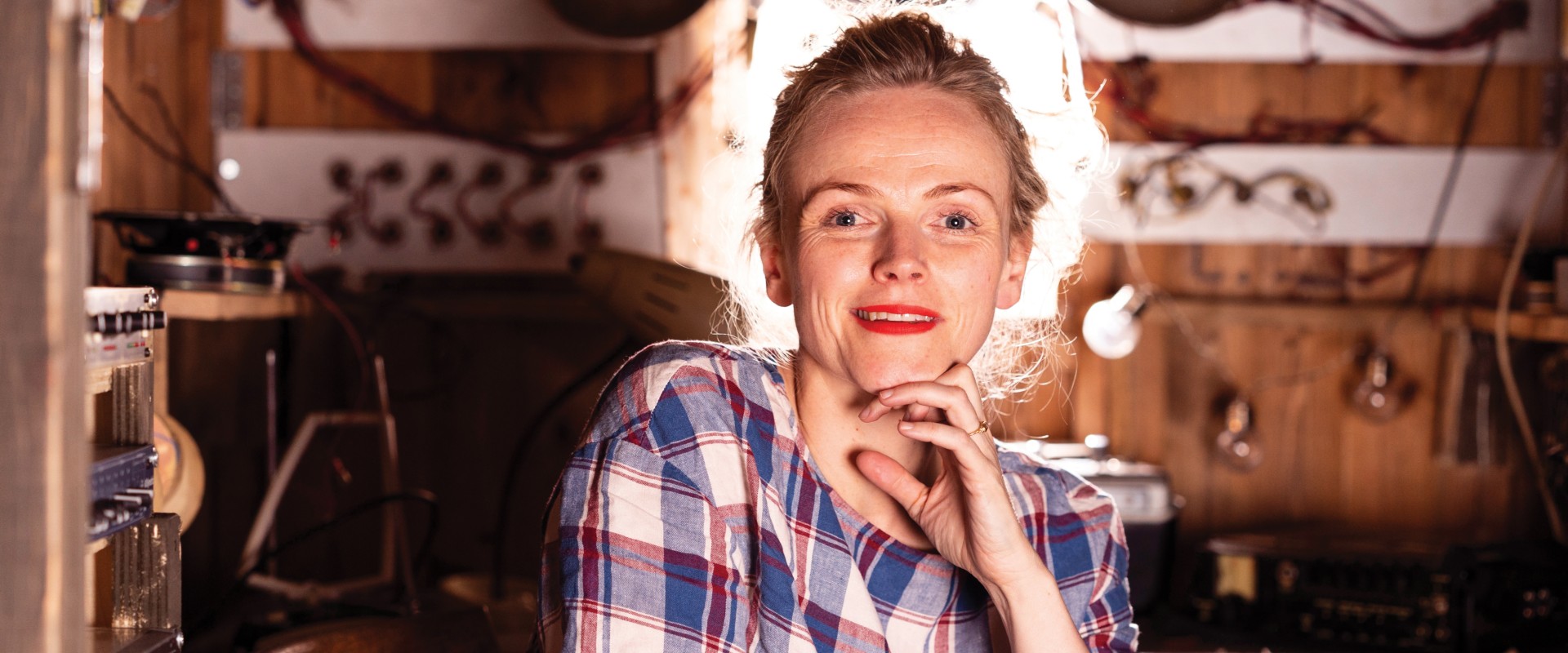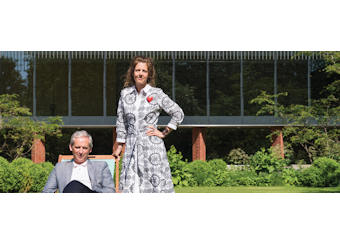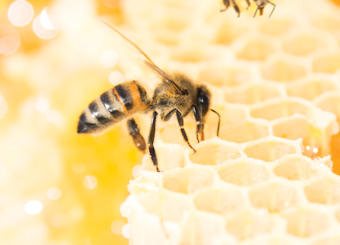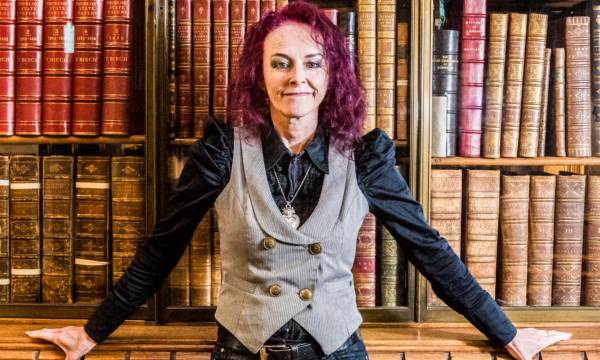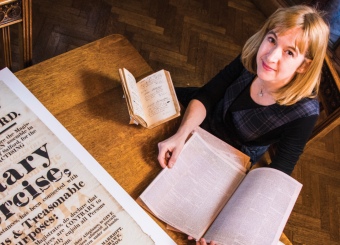No challenge has ever daunted Maxine Peake. The values and determination instilled in her by a humble northern upbringing have steeled her to become one of the nation’s best loved actor-writers. Now, as Honorary Professor of Literature and Performance at the University, she hopes to break down barriers for a new generation seeking to follow in her footsteps.
It’s the day before press night for Maxine Peake’s third stage play, Queens of the Coal Age. Tucked away on a well-worn leather sofa in an alcove of Manchester’s Royal Exchange Theatre, the actor – so familiar to British living rooms for her roles in Shameless, Dinnerladies, Three Girls and many more – could go unnoticed in the bustle of early diners as the theatre cranks into life for the evening’s show.
Maxine’s reputation as one of her generation’s favourite actors precedes her, yet under the sky-reaching, classical pillars of the city-centre theatre, the 44-year-old, with her hair loosely pulled back and only a slick of red lipstick painted on for photographs, is distinctly unassuming.
Appointed this year as Honorary Professor of Literature and Performance at the University, she’s no stranger to crossing over: from screen to stage, actor to playwright, from her native Bolton to London and back again.
Sticking at it
Success is hard-won in acting. For Maxine, it is the reward for talent, but also fearlessness, a strong contrary streak and years of being told that ‘you’re not good enough’.
“I was big, blonde, northern, working class and from Bolton. Basically, it felt like I had not very much going for me if I wanted to be an actor. But in my skewed contraryism, I was like, ‘actually, there’s a niche for people like me’.”
She got into RADA after auditioning “to see what the fuss was about” though only after she’d “tried nearly every theatre and education company in the north-west to try and get a job”.
“I went to college but was asked to leave after two weeks and told ‘you’ve not got it’,” she says. “Ironically, they said to me: ‘Try and get to university and maybe write or do standup, but acting’s not for you.’
“Lots of the girls were from dance schools and were really talented, while I was this slightly dumpy indie kid with a basin haircut, dungarees and big German para boots. I was just a bit of an odd bod and they didn’t know what to do with me. But I didn’t leave because I’m stubborn and I think that’s what’s always got me through. “When people tell you ‘no’, then I suppose it propels you forward.”
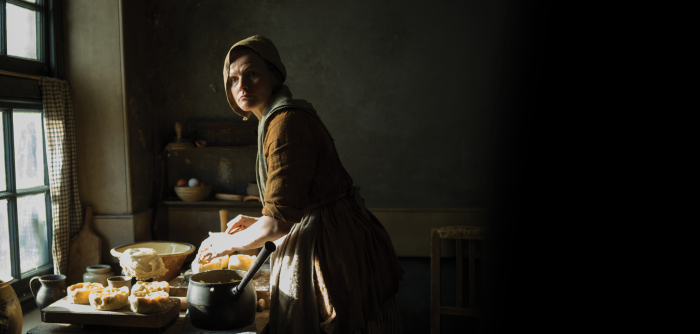
Maxine as Nellie, a working class mother selling pies, in Mike Leigh’s Peterloo. Image from Peterloo used courtesy of Entertainment One
I just go: ‘Yeah, I’m gonna do that.’
Storytelling
Queens of the Coal Age is the third play written by Maxine. It tells the true story of four women, including Anne Scargill, who occupied a Lancashire pit in 1993.
“It’s not that I feel like I’m a writer,” she says, swigging from a two-litre water bottle to ease a hoarse voice. “You do feel that the first criticism will be ‘why doesn’t she just stick to acting?’ But it all feels part of the same thing, about telling stories, and if I want to tell a story and can’t get anybody better than me to write it, then I’ll have a go. It’s the story that’s important.”
She has also penned Beryl, a celebration of unsung British cyclist Beryl Burton, and The Last Testament of Lilian Bilocca, the tale of the Hull wives who fought the government on fishermen’s safety. Most recently she appeared as Nellie, a working class mother selling pies, in Mike Leigh’s historical drama Peterloo, which examines the lives of those caught in the 1819 Peterloo Massacre. Her next TV role will be as Hillsborough campaigner Anne Williams.
It can’t be a coincidence that, as both an actor-writer and a lifelong socialist, Maxine is drawn to the tales of bold, northern women who challenge social injustice. “I just do scripts that interest me. I’ve always been very political – with a big and little p – and interested in stories about social change, but I’m also interested in just entertainment as well.”
Creative Manchester
Maxine’s new academic post supports the University’s £3.3 million Creative Manchester investment in the nation’s talent pipeline and arts economy.
“To paraphrase that song, ‘they are the future’, aren’t they, the students?" Maxine says. “I still think I’m 21 but I’m a proper middle-aged woman. They have really got their finger on the pulse. When you’re at university, that’s when you create, when ideas are formed.
“And especially with that rich history of the University, in every walk of life but especially theatre. It’s produced practitioners, actors and writers. It’s about the University making connections with other organisations and that’s what I think I can bring.
“I’d love to go into the University with Sarah (Frankcom, Artistic Director of the Royal Exchange and Maxine’s long-time collaborator) and get a gang of students and say: ‘Can we workshop this with you?’”
For Maxine, the University also has a vital role to play in opening up opportunities to those who wouldn’t otherwise access them.
“It shouldn’t be elitist or only about people who can afford it, who’ve been to the top schools. A lot of the time you can feel a bit lost till you find your niche, till you feel safe. Some of us are slower starters than others and I don’t think we should be written off at 18.
“We need to start with people young, straight out of university, because there’s so much brilliant talent at that age with so many brilliant ideas, fresh and not tainted.”
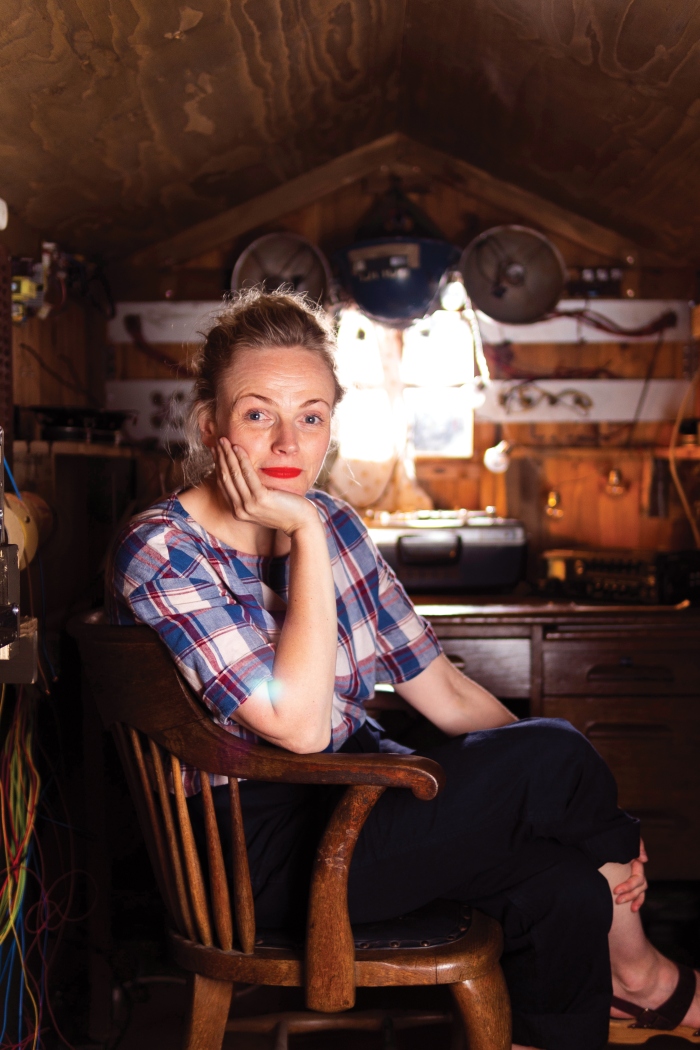
Breaking down barriers
The ambition to break down barriers is also incumbent on the region’s theatres. “I think people can still feel intimidated by spaces like the Royal Exchange,” says Maxine. “But it’s about taking that space back; reclaiming it for a city, a beautifully diverse city.
“I used to come at 15 or 16 and think: ‘I shouldn’t be here in my scruffy jeans and trainers, I feel like I’m being looked down on.’ It’s just about going: ‘This is for you; don’t be intimidated by a few posh voices sat in the audience.’”
Maxine waves wildly at an elderly couple who stop to chat, the parents of an old school friend who came to see her on stage in Samuel Beckett’s Happy Days. “I was quite moved to see them. You do find sometimes people treat you differently,” she concedes. “It’s about keeping yourself grounded. You’re on a hiding to nothing if you don’t.
“I do a job where I’m representing people, so if I cut myself off then I can’t do my job. I meet people and go ‘log that’ for a character –” she breaks off as if filing something in her brain. “A lot of the time I base characters on people I’ve met.”
Northern firebrand
Moving back to Salford from London in 2009 was considered bold by many. Maxine, however, doesn’t understand the fuss.
“I thought, in that arrogant way you do when you’re young, that I’d moved on from Manchester. Then I remember waking up one morning and thinking: ‘I’m going back.’ I was trying to buy a flat in London; it was absolute madness.
“It’s just that I now happen to live where I was born. They don’t say about London actors ‘oh, proud Londoner’. They make such a thing about it and I still find it quite patronising, because it just goes to show there’s still such a big divide.
“I do think that people are going to start coming up to Manchester more. We’ve got fantastic theatres, like the Royal Exchange, like HOME, but we need to pump more money into our blossoming fringe and smaller venues. We need more centres for actors to hang out, because when you’re not working you feel very isolated.
“We need more grants to help them because I think that when you’re not attached to a big organisation, that’s when you can get deeper into the truth, somebody else isn’t holding the purse strings.”
Maxine’s own truth – a down-to-earth actor in a world that bows to stardom; a northern firebrand on the London stage; a champion of unsung stories of social change – is a lesson in the fearlessness she discovered as an awkward teenager; one that bodes well for students who look to her as an inspiration. Now in her 40s, it sticks with her too.
“I still think a big dose of naivety is good,” she affirms. “I don’t really think about the implications of things. I just go: ‘Yeah, I’m gonna do that.’ Fearless.”

